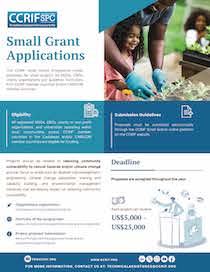Tropical Cyclone Bonnie was the second Tropical Cyclone of the 2022 Atlantic Hurricane Season. On June 28 and 29 the storm system had not yet been designated by NOAA as a tropical cyclone when it passed over Trinidad. However, at that time its maximum sustained winds were higher than 39 mph, which is the condition for a storm system qualifying as a CCRIF Tropical Cyclone Event (these conditions did not extended over Tobago), and therefore this event briefing report is issued for Trinidad.
Trinidad and Tobago was under the influence of potential tropical cyclone #2, which was later named Bonnie by the US National Hurricane Center (NHC), resulting in adverse weather conditions from June 29 to 30, 2022. During this period, while rainfall occurred in both islands, the heaviest rainfall occurred in Tobago.
This event briefing describes the impact of rainfall in Tobago, which was associated with a Covered Area Rainfall Event (CARE), starting on 29 June and ending on 30 June 2022.
Tropical Cyclone Bonnie was the second Tropical Cyclone of the 2022 Atlantic Hurricane Season. On June 28 and 29 the storm system had not yet been designated by NOAA as a tropical cyclone when it passed over Trinidad. However, at that time its maximum sustained winds were higher than 39 mph, which is the condition for a storm system qualifying as a CCRIF Tropical Cyclone Event (these conditions did not extended over Tobago), and therefore this event briefing report is issued for Trinidad.
A magnitude 5.1 earthquake occurred at 10:48:11 UTC on 17 June 2022, 29.4 km (18.3 mi) SSW of The Valley, Anguilla; 44.3 km (27.5 mi) SSW of Sint Maarten and 32.1 km (20mi) SSW of Sandy Ground Village, Anguilla. Initial estimates from the United States Geological Survey (USGS) located the epicentre of the event at 18.472°N, 62.984°W, and at a depth of 34.1 km. Sint Maarten and Anguilla were the only CCRIF member countries where peak ground acceleration, computed with the CCRIF SPHERA EQ model, was greater than 0.01 g for this earthquake.
A magnitude 5.1 earthquake occurred at 10:48:11 UTC on 17 June 2022, 29.4 km (18.3 mi) SSW of The Valley, Anguilla; 44.3 km (27.5 mi) SSW of Sint Maarten and 32.1 km (20mi) SSW of Sandy Ground Village, Anguilla. Initial estimates from the United States Geological Survey (USGS) located the epicentre of the event at 18.472°N, 62.984°W, and at a depth of 34.1 km. Sint Maarten and Anguilla were the only CCRIF member countries where peak ground acceleration, computed with the CCRIF SPHERA EQ model, was greater than 0.01 g for this earthquake.
The Bahamas was under the influence of Tropical Cyclone Alex, resulting in adverse weather conditions from June 2nd to 8th, 2022. During this period, the heaviest rainfall occurred particularly over The Bahamas - Extreme North, and with a lesser extent over The Bahamas - North.
In the period between May 31st and June 2nd, 2022, the remnants of Tropical Cyclone Agatha generated adverse atmospheric conditions that caused moderate to heavy rainfall over several regions of Belize.
This event briefing describes the impact of rainfall on Belize, which was associated with a Covered Area Rainfall Event (CARE), starting on May 31st and ending on June 2nd 2022.
A magnitude 5.0 earthquake occurred at 18:58:38 (UTC) on 25 May 2022, 49.7 km (30.9 mi) ENE of Masachapa, Managua, Nicaragua; 60.3 km (37.5 mi) ENE of San Rafael del Sur, Managua, Nicaragua and 80.8 km (50.2 mi) NE of El Crucero, Managua, Nicaragua. Final estimates from the United States Geological Survey (USGS) located the epicentre of the event at 11.561°N, 86.908°W, and at a depth of 46.0 km.
A magnitude 5.5 earthquake occurred at 13:32:58 (UTC) on 8 May 2022, 70 km (43.5 mi) NNE of Road Town, British Virgin Islands; 85.1 km (52.9 mi) NNE of Cruz Bay, U.S. Virgin Islands and 144.8 km (90 mi) NNE of Saint Croix, U.S. Virgin Islands. Initial estimates from the United States Geological Survey (USGS) located the epicentre of the event at 18.976°N, 64.359°W, and at a depth of 25.0 km.
A magnitude 5.2 earthquake occurred at 23:36:25 UTC on 17 February 2022, 51.1 km (31.7 mi) SSW of Chirilagua, El Salvador, 61.7 km (38.3 mi) SSE of Puerto El Triunfo, El Salvador and 130 km (80.8 mi) ESE of Chinandega, Nicaragua. Initial estimates from the United States Geological Survey (USGS) located the epicentre of the event at 12.788 N, 88.296 W, and at a depth of 68.8 km.





